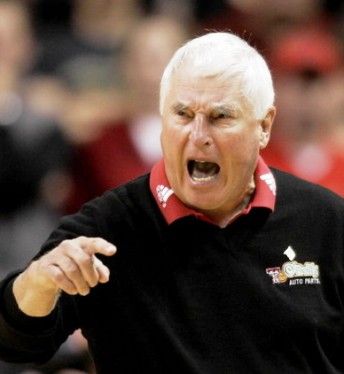Who is Bobby Knight?
He’s a legendary coach who ranks third in all-time wins for NCAA Division I men’s basketball.
Take the word “wins” out of that description and what you really have is a world-class bully who has used his position as a college coach to badger, bully and demean his student players into winning.
For Bobby Knight, winning wasn’t an important thing, it was the only thing.

“You’re not here on scholarship to lose,” Knight tells a student athlete. “I didn’t recruit you to lose. Losing is abnormal; losing is unusual; losing is unacceptable. That’s not what we’re here for.”
As a comic book villain, he’s pitch perfect. As a human being who has been placed in the responsible position of teaching, shaping and inspiring youth, he’s a disgrace. The only reason he continued to coach after being fired from Indiana University was one simple fact: he won basketball games – 11 Big Ten titles and 3 NCAA championship at Indiana University, then went on to win the gold medal in the 1984 Olympics coaching the dream team. (Honestly, people, if you had Michael Jordan, Patrick Ewing and Chris Mullin on your team, how could you lose?)
Now, Knight is out with a new book, The Power of Negative Thinking, (what a stretch for the publisher to come up with that title).
“It’s an antidote to America’s kiss-the-booboo Little League moms,” the New York Post wrote.
“ ‘Every dark cloud has a silver lining,’ Knight writes, in a favorable review by Kirkus ‘The cloud is what you’d better notice.’ “But under the bluster and prickle is a common-sensical approach that is evidently effective if you are a basketball coach with a nose for winning.”
But I’m not here to review the book. I didn’t read it. I’m reviewing the conduct of a man who signed-up to teach basketball. And while he certainly succeeded in winning games he lost sight of the larger purpose of the game and his role as coach and teacher.
I take back the comparison I made recently of former Vice-President Dick Cheney to Shakespeare’s Richard III (Mar. 21). Take it totally back. Knight is Richard III incarnate, and his mantra: Do whatever it takes to win, his only gospel.
While Cheney may have rationalized the use of torture, he believed he was putting the safety of the country first, (not that I condon his actions.)
Knight, on the other hand, was a flat-out bully whose tactics were legalized, sanctified and glorified because… he won.
For Bobby Knight, “winning” was a drug with no substitute.
In May, 2000, before he was fired by Indiana University for his loutish behavior, I wrote that “despite Mr. Knight’s verbal attacks against players, officials, journalists and office staff, and his grabbing a player’s throat at a 1997 practice… university president [Myles Brand], said: ‘I think the ethical approach is to give him one last chance.’ ”
That “chance” lasted barely four months when, in September, Brand finally fired Knight after yet another outburst against a student.
“This kind of thinking is all too common in business as well as sports,” I wrote in that New York Times Op-Ed (May 18, 2000). “What it says is: In spite of the offense, if you apologize and act penitent enough, we will tolerate, allow, make exception. We’ll give you a pass because you’re talented and we want — we need — that talent. Talent is the overriding factor because of what it contributes to big sales and winning teams.”
The problem is there is BIG money in college sports, and if your name is Bobby Knight you are given a pass for little peccadilloes and eccentricities like throwing chairs, screaming in the face of your own players, grabbing the throat of a player and threatening him.
Is it possible to be a successful basketball coach, AND teach, motivate and inspire student players?
You bet!
John Wooden, the legendary “Wizard of Westwood” coached his U.C.L.A. Bruins to ten NCAA championships in twelve seasons and posted four perfect seasons and an 88-game win streak during that run. John Wooden, a gentleman both on and off the court, wrote to me when I was compiling my book of ethical stories, What Do You Stand For?
“In 1934,” Wooden wrote, “I coined my own definition for success, which I tried to personally attain and get all my students to attain. It is ‘peace of mind which is a direct result of self-satisfaction in knowing you did your best to become the best of which you are capable.’ ”
In one of the few negative reviews posted on Amazon.com about Negative Thinking is this: “Bob Knight, your thinking is exactly the type of thinking that created the likes of Lance Armstrong.”
We don’t need another “management & leadership” book written by someone who does NOT know how to behave.
We need more books about people who recognize that real success is much more than winning; it’s about integrity, about how that integrity shows up both in the game and your life.
Bullies like Knight should not be promoted as heroes. And college and university presidents need to take a hard look in the mirror and consider just what’s important: winning-at-any-cost, or role-modeling a reputation of honor.
Comments









